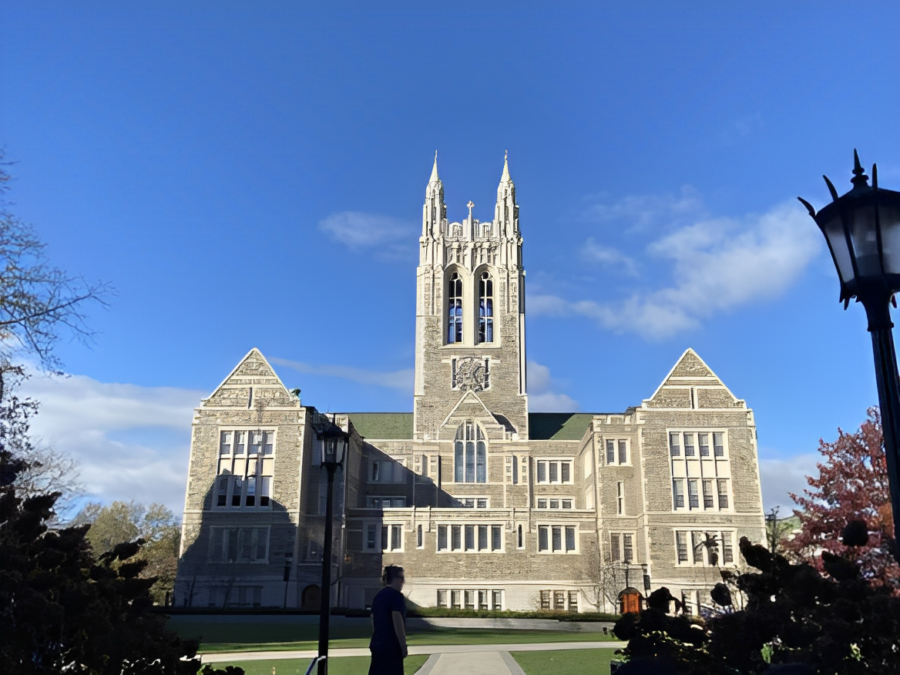What Else Is There Besides College? An Argument For the Benefits of a Gap Year
Every year juniors and seniors stress themselves out about college applications and decisions believing that there is no other option, but is that true?
Ranking in top 36th university nationally according to U.S. News & World Report, Boston College is currently one of the most prestigious universities in America, one that many students from all over the wish to attend.
Colleges become increasingly selective as students put more and more effort into their studies and extracurricular activities — all in hopes of pleasing Ivy League and selective colleges. Students at Bronx Science especially feel the burden of needing to prove to others that they didn’t go to one of the best public schools in the nation for naught. This becomes a source of motivation to do well in school, for many students. Though it is a heavy burden, the students find that this burden comes with great benefits if they are accepted into an Ivy League or selective college, giving them the opportunity to have a wider variety of classes from which to choose and a greater networking experience.
The only problem is, many high school students at Bronx Science strive to do well for the purpose of going to a top college and eventually finding a high paying job without knowing what career path they want to pursue. To not know one’s career path at a young age isn’t an issue, but it becomes an issue when students decide to choose a focus based on monetary potential alone.
It is generally understood that there are countless benefits to going to college. Over 50% of college graduates found their degrees useful in both their personal and professional lives, according to Kim Parker, the Director of Social Trends Research at Pew Research Center and her team, in a report issued by Pew Research Center. By simply attending a college or university, students have access to an expanded network of individuals just like them.
Going to college is a cardinal moment for many, serving as the starting point of young adults’ careers. Attending a good college means a better education with a wider network of individuals who are just as passionate. There is, however, a huge cost — that being high school. By dedicating a majority of time to getting into a good college, students find that they miss out on a lot of high school life.
In an interview that I conducted with eleven New York City high school students (mostly from Bronx Science), six expressed dissatisfaction with their student life in high school due to the heavy focus on college applications. Despite their large sacrifice, a majority of them blamed themselves for not receiving acceptances from their dream colleges.
“I wish I had taken more Advanced Placement courses in order to demonstrate a more rigorous course load,” said Arnab Bhowmik ’23.
From the moment that ninth graders enter high school across America, they are pressured to take Advanced Placement courses. Students are told that A.P. courses look good on college applications, so consequently, they will overload themselves by taking advanced courses in which they may not even be interested.
“I think I should have dropped one mathematics class in order to take electrical engineering, instead. I wanted to explore more hands-on work as opposed to theoretical math,” said Yunxi Wang ’23. Many students feel this way, in retrospect. Many students argue that the benefits outweigh the cost. Some of these benefits include the fact that college admissions will put students into higher consideration if they achieve higher scores on A.P. exams or their Grade Point Averages. Administrators at The Princeton Review agree that Advanced Placement exams give students an upper hand in a student’s academic studies at a college level.
While A.P. exams provide the essential knowledge needed for an individual to meet the qualifications for higher-end jobs, they often do not teach the fundamentals of life – socializing and the steps necessary that lead up to acquiring the high-end job. In addition, many students taking A.P. exams are ultimately disappointed when they find out that not all A.P. credits are accepted for college credit, depending on the college. Top colleges like New York University and Brown University have begun to move away from judging students based on A.P. exam scores, said Miah Garcia in an article published on The Iliad.
As colleges begin stepping away from basing acceptances on exam scores, they place a greater focus on extracurricular activities. Instead of only judging a student based based on numbers alone, admissions officers are encouraged to characterize students by how well they would fit into their school of choice.
Activities such as volunteering, participating in school clubs, and working part-time jobs have become some of the strongest points of interest for colleges. Colleges advertise not only academics, but student life as well. However, college isn’t the only place to acquire these skills.
“A lot of the areas that I’m looking into exploring in college are international relations-related. These topics can feel really abstract and foreign if you only study them in a classroom,” said Kai Millici in an interview with the Gap Year Association. Kai Millici is a member of the Global Citizen Year who decided to take a gap year after high school. In the interview, she expressed her gratitude for having taken a gap year, unlike her other peers, who either went to college or dropped out.
Taking a gap year is a tough decision. Although it is often not recommended due to the risk of being unable to find a career path or to get anything done, some of the students who do choose to commit to a gap year have found it to be a rewarding experience. Millici, for example, reported an overwhelmingly positive experience on her time spent taking the gap year.
“I have so much more experience […] than if I just went straight to college.” She adds that she has a clearer understanding of what she wants to study and more clarity on how she plans on spending her time.
Having time off from school or work is essential for everyone, but some say they prefer to have a longer break. “Regardless of the circumstances leading to it,…a gap year should be an intentional undertaking,” said Elka Maria Torpey, an economist in the Office of Occupational Statistics and Employment Projections, in the U.S. Bureau of Labor Statistics.
When people first hear of the concept of a “gap year,” they may think about laziness or slacking off. However, that is not all the case when it comes to taking gap years. Taking an “intentional” gap year means that students know that they will be doing something productive or worthwhile with their time. It’s something done to improve their lives and possibly get ahead of their peers, in a sense. Students who choose to take gap years often have plans to actively prepare themselves to enter the world as a more well-rounded person.
When taking a gap year, students may also utilize online learning or social media. The general opinion is that social media is a distraction from learning and academic growth. However, that is quickly proven to be false as more people take advantage of social media in order to further progress their growth. In a study conducted by Jae-Eun Oh, an Associate Professor and program leader for the B.A. in Digital Media at The Hong Kong Polytechnic University’s School of Design, along with her team, found that it “provides a greater opportunity for students to reach content relevant to their interests. This enhances student interest and enjoyment in learning.”
Despite the multitude of benefits that can be gained through studying abroad, this should not be taken as a sign for every student to take a gap year. It is a choice that students may consider — but they must take risks into heavy consideration, as there is little guidance, and all the responsibility is on the individual alone. In the end, every individual is different and has different preferred learning methods.
College is worth as much as an individual takes it to be worth. Everyone learns differently, and going to college is one of the ways in which they are able to explore their interests. It’s never too late to start reconsidering options, as there are so many opportunities that lie ahead. There is no end of the road unless you deem there to be.
There is no one method that suits everyone, but going to college happens to be the safer option.
Going to college is a cardinal moment for many, serving as the starting point of young adults’ careers. Attending a good college means a better education with a wider network of individuals who are just as passionate. There is, however, a huge cost — that being high school. By dedicating a majority of time to getting into a good college, students find that they miss out on a lot of high school life.
Jasmine Chen is an Editorial Editor for ‘The Science Survey.' She finds joy in bringing stories to life through the focus of one small detail at a time,...












